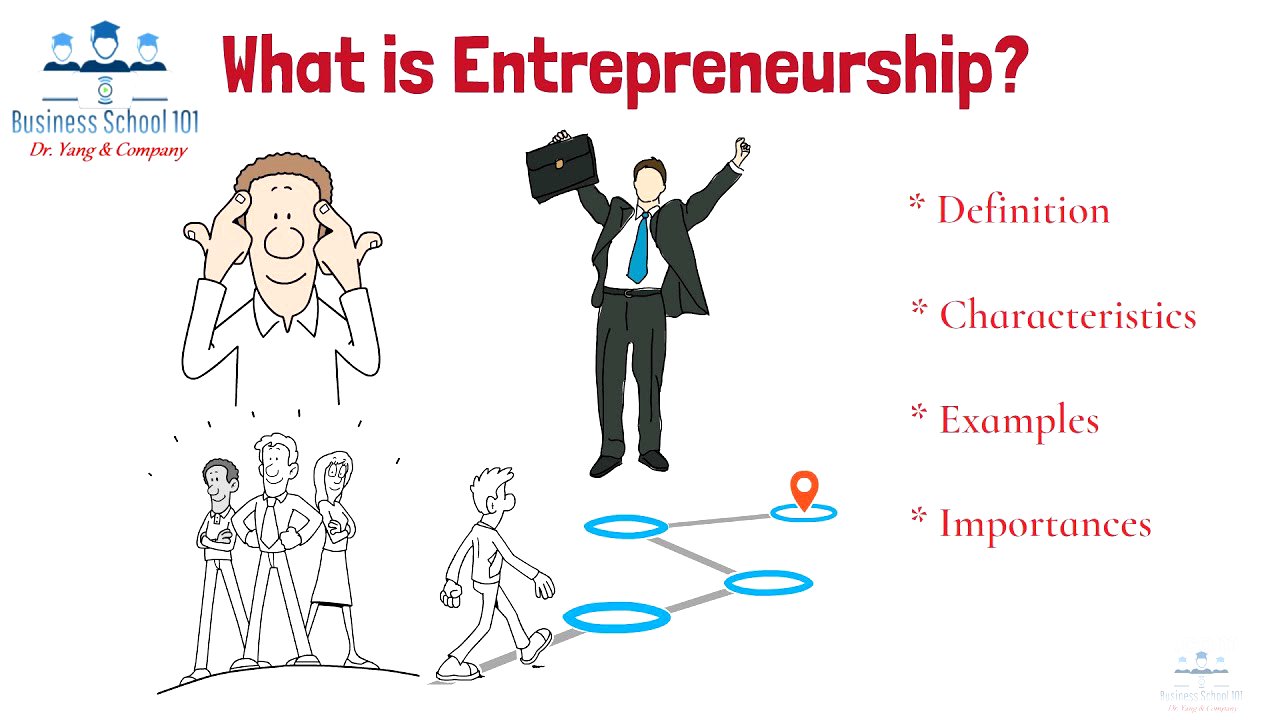TLDR;
This video provides a comprehensive overview of entrepreneurship, defining it as a process of innovation, risk-taking, and value creation. It highlights key characteristics of successful entrepreneurs, including innovation, risk-taking, resilience, vision, adaptability, passion, customer focus, persistence, networking, and leadership. The video also emphasizes the importance of entrepreneurship for job creation, innovation, economic growth, and fostering competition.
- Entrepreneurship is about innovation, risk-taking, and value creation.
- Key traits include resilience, vision, adaptability, and customer focus.
- Entrepreneurship drives job creation, innovation, and economic growth.
Definition of Entrepreneurship [0:28]
Entrepreneurship is defined as the process of identifying a business opportunity, gathering resources, and taking risks to create and grow a new business. It involves innovation, problem-solving, and creating value. Entrepreneurs are individuals who recognize opportunities in challenges and are willing to take risks to bring their ideas to fruition.
Key Characteristics of Entrepreneurs [0:54]
Entrepreneurs share several key characteristics that contribute to their success:
Innovation [1:03]
Entrepreneurs are innovators who introduce new ideas, products, or services to address unmet needs or solve problems in unique ways. Innovation involves improving existing processes or creating entirely new solutions. Elon Musk's ventures, such as Tesla and SpaceX, exemplify this trait by redefining industries and inspiring others.
Risk-Taking [1:48]
Entrepreneurs must be willing to take financial, professional, and personal risks to pursue their vision. Jeff Bezos's decision to leave a secure job to start Amazon, an online bookstore, demonstrates this characteristic. His willingness to invest in a novel idea transformed the way people shop and do business online.
Resilience [2:33]
Resilience is the ability to recover from setbacks, adapt to change, and persevere despite challenges. Jack Ma, the founder of Alibaba, faced numerous rejections before founding his company. His resilience was critical in overcoming the early challenges of building an online marketplace in China.
Vision [3:24]
A clear and compelling vision guides entrepreneurs' decisions and inspires others to join their journey. Steve Jobs's vision for Apple was to create products that would revolutionize how people interact with technology. This vision led to the development of iconic products like the iPhone and iPad.
Adaptability [4:12]
Adaptability is the ability to adjust to new conditions and pivot strategies in response to changing market dynamics or unforeseen challenges. Reed Hastings, the co-founder of Netflix, demonstrated adaptability by transitioning the company from a DVD rental service to a streaming platform, fundamentally changing how people consume media.
Passion [4:58]
Passion fuels entrepreneurs' persistence and commitment to their business goals. Sarah Blakeley, the founder of Spanx, was passionate about creating a product that would solve a common problem faced by women. Her passion led her to invest her life savings into developing Spanx, a line of comfortable and innovative shapewear.
Customer Focus [5:45]
A strong focus on understanding and meeting customer needs is critical for entrepreneurial success. Howard Schultz, the former CEO of Starbucks, transformed Starbucks into a global brand by focusing on the customer experience, envisioning Starbucks as a "third place" between home and work.
Persistence [6:32]
Persistence is the unwavering determination to keep pushing forward, even in the face of obstacles and setbacks. Walt Disney faced multiple business failures before creating the Disney Empire. His persistence paid off when he founded the Walt Disney Company, which grew into one of the largest media and entertainment companies in the world.
Networking [7:17]
Networking involves building strong relationships with customers, investors, partners, and other stakeholders to open doors to new opportunities, resources, and support. Richard Branson, the founder of the Virgin Group, is known for his extensive network and ability to leverage relationships across various industries.
Leadership [8:02]
Strong leadership is essential for entrepreneurs to inspire and guide their teams, manage resources effectively, and steer their companies through growth and challenges. Indra Nooyi, the former CEO of PepsiCo, demonstrated exceptional leadership by leading PepsiCo through significant strategic shifts, including the expansion into healthier product lines and a greater focus on sustainability.
Importance of Entrepreneurship [8:45]
Entrepreneurship is crucial to society for several key reasons:
Job Creation [8:52]
Entrepreneurs are a primary source of job creation by starting new businesses, which helps reduce unemployment rates and supports economic stability. Startups and small businesses often drive job growth, especially in emerging sectors like technology.
Innovation [9:15]
Entrepreneurs are often at the forefront of innovation, introducing new products, services, and technologies that can transform industries and improve the quality of life. Companies like Apple and Tesla have revolutionized their respective industries through continuous innovation.
Economic Growth [9:39]
Entrepreneurship stimulates economic growth by increasing competition, improving productivity, and driving demand. When entrepreneurs succeed, their businesses expand, contributing to higher GDP and overall economic development.
Competition and Efficiency [10:03]
Entrepreneurship fosters competition, which drives businesses to improve their products, services, and processes. This competition leads to greater efficiency, lower prices, and better choices for consumers, benefiting the economy as a whole.
Summary [10:25]
Entrepreneurship is about innovation, taking risks, and creating value that drives economic growth and societal change. Entrepreneurs are visionary, resilient, and determined to turn their ideas into reality despite the challenges they may face. Understanding entrepreneurship is key to understanding the forces that shape our world.









